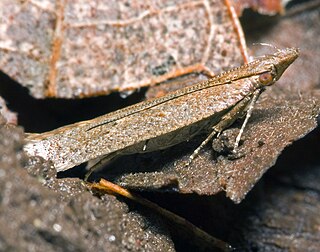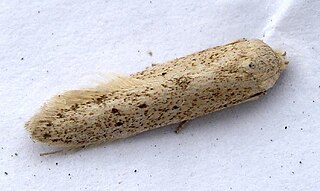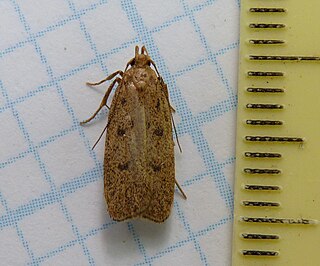
The Elachistidae are a family of small moths in the superfamily Gelechioidea. Some authors lump about 3,300 species in eight subfamilies here, but this arrangement almost certainly results in a massively paraphyletic and completely unnatural assemblage, united merely by symplesiomorphies retained from the first gelechioid moths.

The Gelechiidae are a family of moths commonly referred to as twirler moths or gelechiid moths. They are the namesake family of the huge and little-studied superfamily Gelechioidea, and the family's taxonomy has been subject to considerable dispute. These are generally very small moths with narrow, fringed wings. The larvae of most species feed internally on various parts of their host plants, sometimes causing galls. Douglas-fir (Pseudotsuga) is a host plant common to many species of the family, particularly of the genus Chionodes, which as a result is more diverse in North America than usual for Gelechioidea.

Gelechioidea is the superfamily of moths that contains the case-bearers, twirler moths, and relatives, also simply called curved-horn moths or gelechioid moths. It is a large and poorly understood '"micromoth" superfamily, constituting one of the basal lineages of the Ditrysia.

The Coleophoridae are a family of small moths, belonging to the huge superfamily Gelechioidea. Collectively known as case-bearers, casebearing moths or case moths, this family is represented on all continents, but the majority are found in temperate areas of the Northern Hemisphere. They are most common in the Palearctic, and rare in sub-Saharan Africa, South America, and Australia; consequently, they probably originated in northern Eurasia. They are relatively common in houses, they seek out moist areas to rest and procreate.

Acompsia is a genus of the twirler moth family (Gelechiidae). Though it has once been assigned to the proposed subfamily "Anacampsinae", it is generally placed in the Dichomeridinae. Some authors include Telephila here as a subgenus, while others prefer to keep it distinct as its relationships are fairly obscure.
Anaptilora is a moth genus. It is here placed in subfamily Autostichinae of family Autostichidae, though some authors assign it elsewhere in the Gelechioidea.

Brachmia is a genus of the twirler moth family (Gelechiidae). Among these, it is mostly placed in the subfamily Dichomeridinae.
Ephysteris is a genus of the twirler moth family (Gelechiidae). Among these, it is assigned to tribe Gnorimoschemini of the subfamily Gelechiinae. Even though it is a rather diverse and widespread group, most of these small and inconspicuous moths were overlooked by scientists until the early 20th century. Almost 90 species are known today but new ones are still being discovered.

Hypatima is a genus of the twirler moth family (Gelechiidae). Among these, it belongs to a distinct lineage, which is variously treated as tribe Chelariini in subfamilies Dichomeridinae, Gelechiinae, or even Pexicopiinae, and historically was considered a subfamily in its own right, Chelariinae. Of this lineage, Hypatima – under its junior synonym Chelaria – is the type genus. This genus has numerous species, but its exact limits are not quite clear. This genus occurs mainly in the Southern Hemisphere, though one of the better-known species is the only member of this genus native to Europe, the lobster-clawed moth.

Blastobasis is the type genus of the gelechioid moth family Blastobasidae; in some arrangements these are placed in the case-bearer family (Coleophoridae) as a subfamily. Within the Blastobasidae, the subfamily Blastobasinae has been established to distinguish the Blastobasis lineage from the group around Holcocera, but the delimitation is not yet well-resolved.

Erechthias is a genus of the fungus moth family, Tineidae. Therein, it belongs to the subfamily Erechthiinae, of which it is the type genus. The exact circumscription of this genus is still disputed, but it may encompass more than 150 species.

Opogona is a genus of the fungus moth family, Tineidae. Therein, it belongs to the subfamily Hieroxestinae. As it includes Opogona omoscopa, the type species of the now-abolished genus Hieroxestis, it is the type genus of its subfamily.

Monopis is a genus of the fungus moth family, Tineidae. Therein, it belongs to the nominate subfamily, Tineinae.

The Depressariinae – sometimes spelled "Depressiinae" in error – are a subfamily of moths in the superfamily Gelechioidea. Like their relatives therein, their exact relationships are not yet very well resolved. It has been considered part of family Elachistidae sensu lato or included in an expanded Oecophoridae. In modern classifications they are treated as the distinct gelechioid family Depressariidae.

The four-spotted yellowneck, also known as the leaf litter moth, is a species of gelechioid moth. It is native to Western Europe, from France to Belgium, Germany and Austria, south to the Iberian Peninsula, and north to Ireland, Wales and England. Older sources claim its range to extend further eastwards, but this seems to be based on misidentifications of related and very similar species. It is also found in southern Canada and throughout the United States.

The Oecophorinae are the nominate subfamily of moths in the concealer moth family (Oecophoridae). They are part of the insufficiently studied superfamily Gelechioidea, and like their relatives, the circumscription of this taxon is disputed.

The Symmocinae are a subfamily of moths in the superfamily Gelechioidea. These small moths are found mainly in the Palearctic and Africa.

Tinea is a genus of the fungus moth family, Tineidae. Therein, it belongs to the subfamily Tineinae. As evident by its name, it is the type genus of its subfamily and family. Established as one of the first subgroups of "Phalaena", it used to contain many species of Tineidae that are nowadays placed in other genera, as well as a few moths nowadays placed elsewhere.

Autosticha is a genus of gelechioid moths. It belongs to the subfamily Autostichinae, which is either placed in the concealer moth family (Oecophoridae), or in an expanded Autostichidae. It is the type genus of its subfamily. Originally, this genus was named Automola, but this name properly refers to a fly genus in family Richardiidae.

Dichomeridinae is a subfamily of moths in the family Gelechiidae.


















